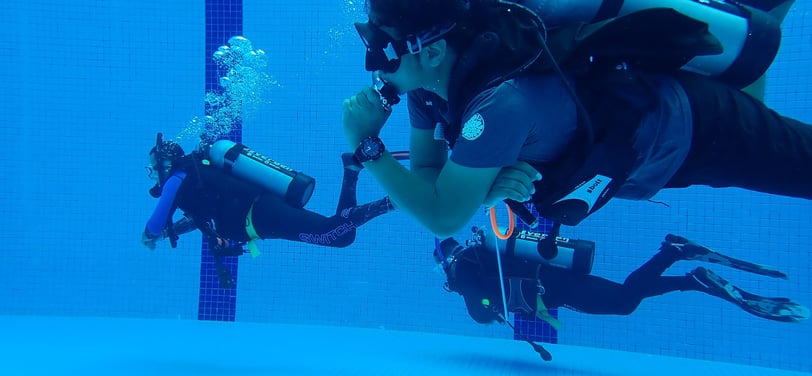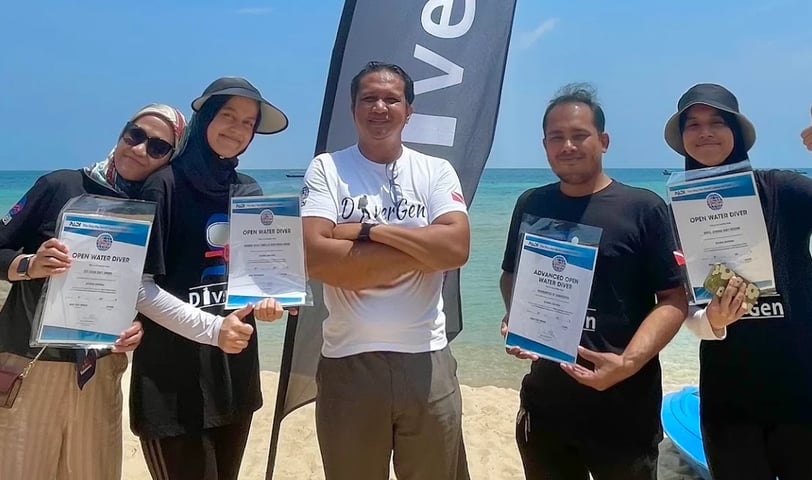Diving into the Next Chapter: My Journey from Try-Out to Open Water Certification
Join me as I reflect on my first scuba diving try-out experience and explore the valuable lessons learned. Discover why I'm taking the plunge into the Open Water Certification, and how this journey is shaping my path to becoming a confident and skilled diver.
DIVE JOURNEY
Author: DiverGen
8/16/20246 min read


Reflecting on your recent scuba try-out session, you've gained invaluable insights into the fundamentals of scuba diving. This initial step marks the beginning of what could be a lifelong passion for exploring the underwater world. In this reflection, we’ll summarize the main takeaways from your experience, discuss how you can apply this knowledge in practical scenarios, explore why you should consider taking an Open Water course, and identify areas where further study or review might be beneficial.
Main Takeaways from the Scuba Try-Out
Basic Equipment Familiarization:
Understanding Your Gear: During your try-out, you were introduced to the basic scuba diving equipment, including the mask, snorkel, fins, and buoyancy control device (BCD). These items are the cornerstone of a successful dive. Knowing how to properly wear, adjust, and use this gear is crucial for both your safety and comfort underwater.
Mask and Snorkel: The mask allows you to see clearly underwater, while the snorkel enables you to breathe at the surface without using your air supply. Learning to clear your mask of water and to breathe calmly through the snorkel are essential skills.
Fins: These are your underwater propulsion tools. The fins you used help you move efficiently through the water with minimal effort. Understanding how to kick properly reduces fatigue and allows you to cover more distance during a dive.
Buoyancy Control Device (BCD): The BCD is a critical piece of equipment that allows you to manage your buoyancy underwater. It helps you maintain your position in the water column, whether you want to float, hover, or sink. Getting familiar with the BCD’s inflator and deflator mechanisms is key to mastering buoyancy control, which we’ll delve into further.
Breathing Techniques:
Breathing Through a Regulator: One of the most significant aspects of scuba diving is breathing through a regulator. This device delivers air from your tank to your mouth at the correct pressure, allowing you to breathe comfortably underwater. During your try-out, you practiced this skill, which is fundamental to diving.
Controlled Breathing: You learned the importance of controlled, slow breathing. This technique not only conserves air but also plays a crucial role in managing buoyancy. By mastering this, you’ll be able to extend your dive time and maintain a relaxed state underwater, which is essential for a positive diving experience.
Buoyancy Basics:
Understanding Buoyancy: Buoyancy control is the ability to manage your body’s position in the water, which is vital for a safe and enjoyable dive. During your try-out, you began to understand how to use your BCD and breathing to achieve neutral buoyancy, where you neither sink nor float.
Practical Application: Proper buoyancy control allows you to hover effortlessly above the ocean floor, minimizing disturbance to the marine environment. It also prevents you from expending unnecessary energy, making your dive more comfortable and enjoyable. As you continue diving, fine-tuning this skill will be crucial.
Equalization:
Why Equalization is Important: As you descend in water, pressure increases, which can cause discomfort in your ears. During your try-out, you learned the importance of equalizing the pressure in your ears, a process that involves gently blowing while pinching your nose or swallowing.
Timing of Equalization: Regular and proactive equalization during your descent is necessary to avoid discomfort or potential injury. Mastering this technique ensures a smooth and enjoyable descent, allowing you to focus on the beauty of the underwater world rather than any physical discomfort.
Underwater Communication:
Hand Signals: Communication underwater is vastly different from on land due to the inability to speak. During your try-out, you were introduced to basic hand signals that divers use to convey essential information, such as indicating how much air is left, if something is wrong, or when to ascend.
Importance of Communication: Effective underwater communication is crucial for safety. Being able to understand and use these signals ensures that you and your dive buddy can coordinate actions, respond to potential issues, and navigate the dive site together seamlessly.
Practical Applications of This Knowledge
Improved Comfort and Safety: The skills you’ve learned during your try-out are foundational to diving safely and comfortably. For instance, understanding how to properly use your equipment means you’re less likely to encounter problems underwater. Similarly, controlled breathing and effective buoyancy management will make your dives smoother and more enjoyable.
Building a Strong Foundation: The basics you’ve covered lay the groundwork for more advanced diving skills. As you progress, these fundamentals will serve as the building blocks for more complex techniques, such as underwater navigation, deep diving, and night diving. The more proficient you become at these basics, the easier it will be to advance to higher levels of diving.
Environmental Awareness: Diving is not just about exploring the underwater world; it’s also about preserving it. By mastering buoyancy and controlled breathing, you’ll minimize your impact on marine ecosystems. For example, proper buoyancy control prevents you from accidentally touching or damaging coral reefs or stirring up sediment that can obscure visibility and disrupt marine life.
Why Consider an Open Water Course?
Now that you’ve completed your try-out, you might be wondering what’s next. The logical progression is to enroll in an Open Water course, and here’s why:
Comprehensive Training:
Diving Beyond the Basics: While your try-out introduced you to the fundamental skills, an Open Water course offers a comprehensive training program that covers everything you need to become a certified diver. This includes dive planning, emergency procedures, and advanced buoyancy techniques.
Theory and Practice: The course combines classroom learning with practical sessions. You’ll deepen your understanding of how diving affects the body, learn about dive tables and computers, and practice advanced skills in controlled environments before applying them in open water dives.
Certification and Independence:
Global Recognition: An Open Water certification is recognized worldwide, allowing you to dive independently (within certain limits) at dive sites around the globe. This opens up a world of diving opportunities, from exploring coral reefs to discovering shipwrecks.
Diving with Confidence: The course builds on what you’ve learned in your try-out, enhancing your skills and confidence. As a certified diver, you’ll be able to dive without an instructor, giving you more freedom to explore dive sites and enjoy the underwater world on your terms.
Exploration and Adventure:
Access to New Dive Sites: With an Open Water certification, you’ll be able to dive at a variety of sites, many of which are inaccessible to non-certified divers. Whether you’re interested in vibrant coral reefs, mysterious shipwrecks, or unique underwater topographies, certification gives you the key to these underwater adventures.
Community and Camaraderie: Diving is also a social activity. By taking the course, you’ll join a global community of divers who share your passion for the ocean. You’ll have the opportunity to meet new people, share experiences, and maybe even participate in group dives and underwater conservation efforts.
Areas for Further Study or Review
As you prepare to take the next step in your diving journey, it’s important to identify areas where further study or practice might be beneficial:
Buoyancy Mastery:
Continuous Improvement: While you’ve been introduced to buoyancy control, mastering this skill takes time and practice. Consider spending additional time in the pool or shallow water practicing buoyancy drills. This will help you become more comfortable and efficient in maintaining neutral buoyancy, which is crucial for advanced dives.
Dive Planning and Navigation:
Understanding Dive Tables: Dive planning is an essential aspect of safe diving. Learning how to use dive tables and computers to plan your dives helps you avoid decompression sickness and manage your air supply effectively. This is a key area to focus on as you progress in your training.
Underwater Navigation: Being able to navigate underwater using natural landmarks and a compass is another critical skill. This will allow you to explore dive sites with confidence and avoid getting lost. Practice this skill in familiar environments before attempting more complex dive sites.
Emergency Procedures:
Handling Emergencies: While your try-out touched on basic safety, the Open Water course will delve deeper into emergency procedures. This includes handling out-of-air situations, assisting other divers, and performing underwater rescues. Familiarize yourself with these scenarios to build your confidence and readiness.
Conclusion: Embracing the Journey into Scuba Diving
Reflecting on your scuba try-out, it’s clear that you’ve taken an important first step in what could be a rewarding journey into the world of scuba diving. The skills and knowledge you’ve gained are not only foundational but also essential for safe and enjoyable diving experiences. By considering an Open Water course, you’ll be building on these basics, gaining the certification and skills needed to explore the underwater world more independently and confidently.
At DiverGen, we’re committed to supporting your diving journey every step of the way. Whether you’re a beginner looking to take your first certified dive or someone seeking to enhance their skills, we offer the training and resources you need to succeed. Diving is more than just a hobby; it’s an invitation to explore, learn, and connect with the ocean in a meaningful way. So, why not take the plunge and continue your adventure with DiverGen? Dive in, discover the wonders beneath the waves, and let us be your guide in this incredible underwater world.


Explore
Premier provider of scuba diving experiences and professional courses.
Passion
Ocean
diverlogyventures@gmail.com
+6012-2234432
© 2024 Diverlogy ventures (NS0302402-A) . All rights reserved.

